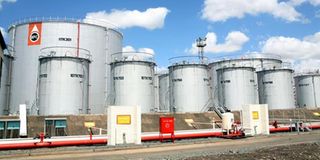Government steps up crackdown on rogue oil dealers as supply normalizes

Oil storage tanks at the Kenya Pipeline Company in Nairobi. Government says normal fuel supply has resumed.
The government is stepping up its crackdown on rogue oil marketing companies after censuring four retail stations that were found selling fuel at higher-than-recommended prices even as supply of the commodity normalises across the country.
The long winding queues at petrol outlets have dissipated just days after the Energy and Petroleum Regulatory Authority (Epra) on Thursday increased the cost of petrol, diesel and kerosene by Sh9.90 pushing the cost of the three products to a historic high.
Epra raised petrol prices in Nairobi to Sh144.62, that of diesel to Sh125.50 and that of kerosene to Sh113.44 per litre, the highest the products have ever cost in the country.
The normal supply comes days after acting Petroleum Cabinet Secretary Monica Juma lambasted oil companies accusing them of deliberately causing an artificial fuel shortage by withholding their stocks until fuel prices are pushed upwards to reap higher profits.
“We have determined that some players were hoarding the product, awaiting the “14th day of the month” price review so as to cash in on the windfall. This speculative character is not only bad faith but is insensitive to the situation that is upon Kenyans,” said the CS.
Now, the Ministry says 10.6 million litres of petrol and 13.3 million litres of diesel were distributed across the country over the Easter weekend signalling an end to the two-week long fuel shortage.
It said the Kenya Pipeline Company (KPC) holds a further 52.9 million litres of petrol and 82.1 million litres of diesel as of Monday, with a further 120 million and 212 million litres of the products respectively slated for discharge.
Epra has now cracked the whip on four rogue retail stations who took advantage of the crisis and sold fuel at prices higher than the maximum set by the energy regulator.
“The stations were located at Migori, Kehancha, Awendo and Isebania. Stern action will be taken against the operators,” said the Ministry in a statement.
It said the Directorate of Criminal Investigations (DCI) has begun probe into oil companies that did not have sufficient fuel stocks during the crisis period leading to the shortage.
“The DCI has commenced investigations on companies that were reported not to maintain minimum operational stocks or to hoard petroleum in the past two weeks,” it said.
Also on the chopping block are large oil companies that have been selling on wholesale to small oil dealers at exorbitant prices forcing some of the small dealers to close shop during the period for lack of economic sense in business continuity.
For instance, some small oil dealers, who make about 30 per cent of the entire retail network, have complained that they are being sold fuel by the wholesalers at pump prices.
This as executives of oil firms on Friday started to appear at the DCI after Epra issued show-cause letters to 10 oil marketing companies (OMCs) over unexplained shortage of the product.
The executives of Vivo Energy Kenya, Total Energies, Petro Oil, Gapco Kenya Ltd, Riva Petroleum, and Ola Energy Kenya were scheduled for grilling by detectives after they were slapped with show-cause letters by the energy regulator.
The top executives of Galana Oil, Lake Oil, Lexo Oil, and Hass Petroleum were also summed to appear before the DCI for questioning.
The Ministry says it undertaking the process of re-allocation of import capacities of OMCs and will complete the exercise by Thursday.
This after it last week approved slashing for the next three import cycles of import capacities of oil companies that had resorted to exporting their product at the expense of the local market, causing the fuel shortage.
Conversely, the government said it would reward the oil firms that had sold more of their product locally as compared to before the crisis by increasing their import allocation.





